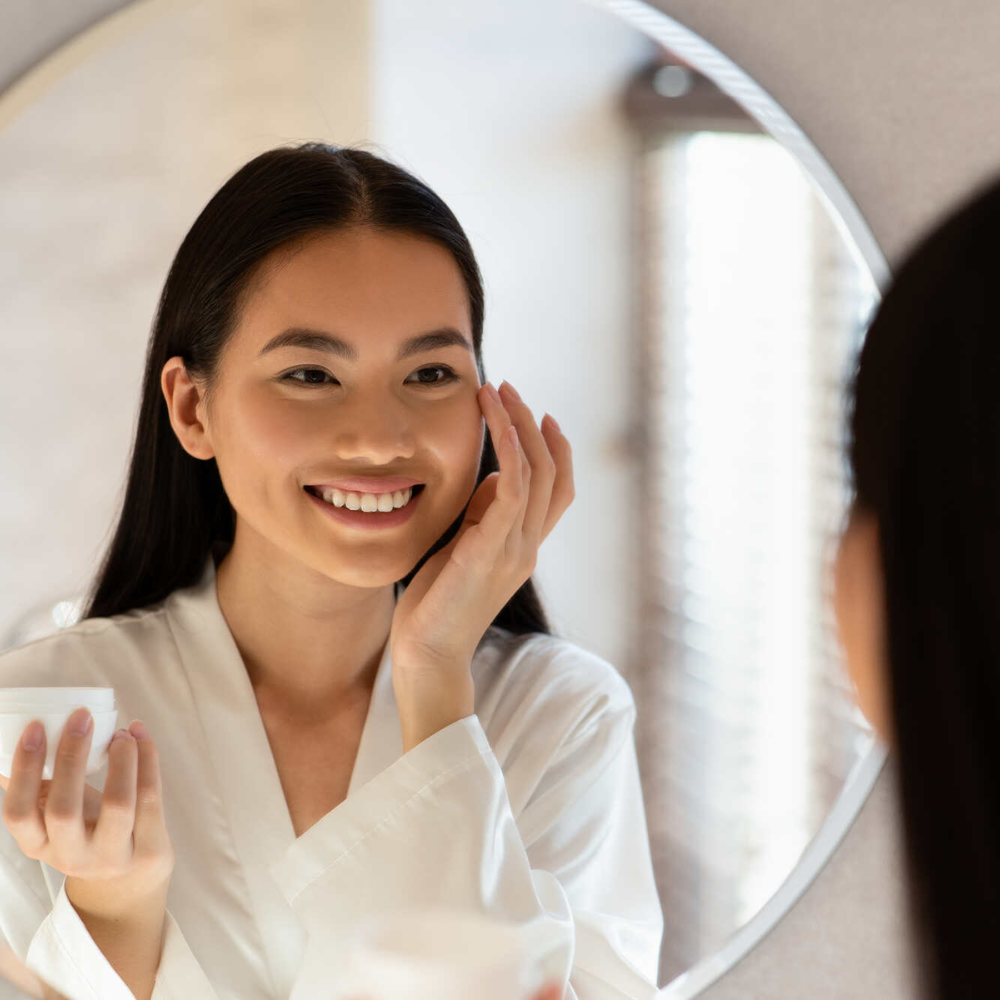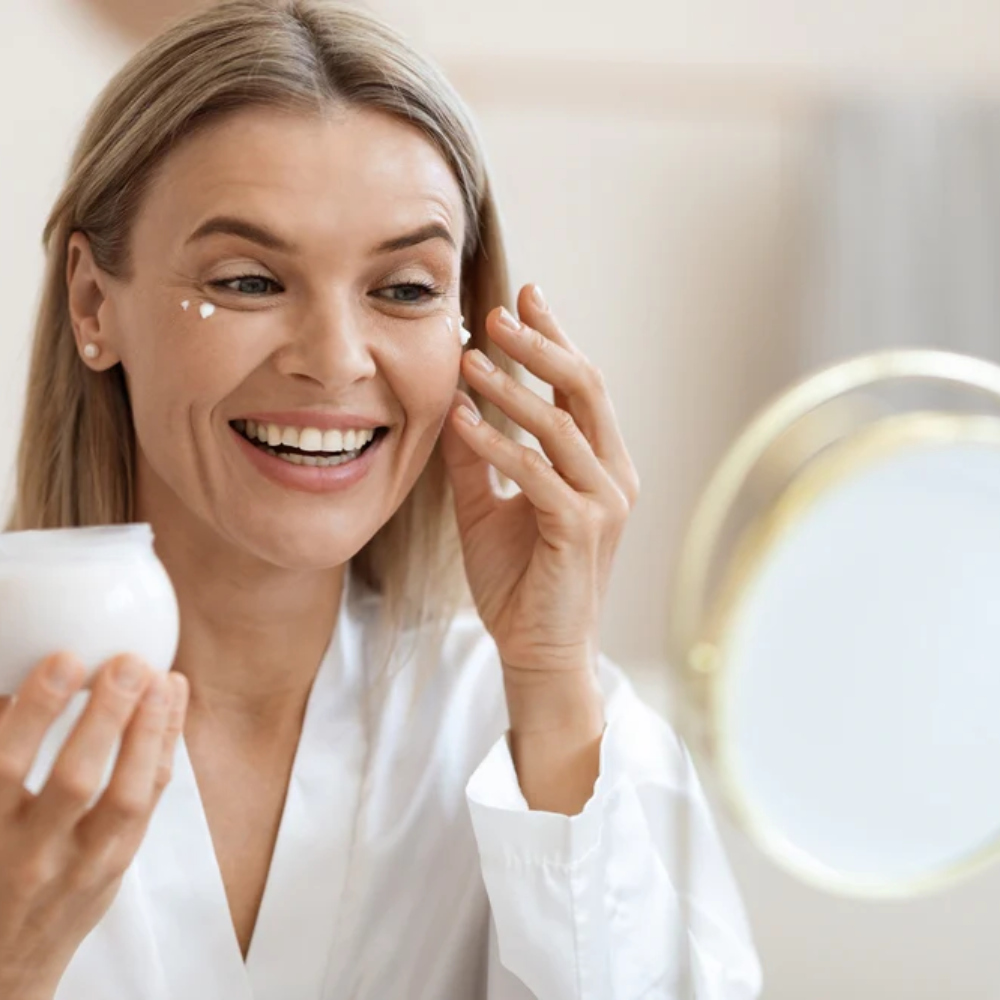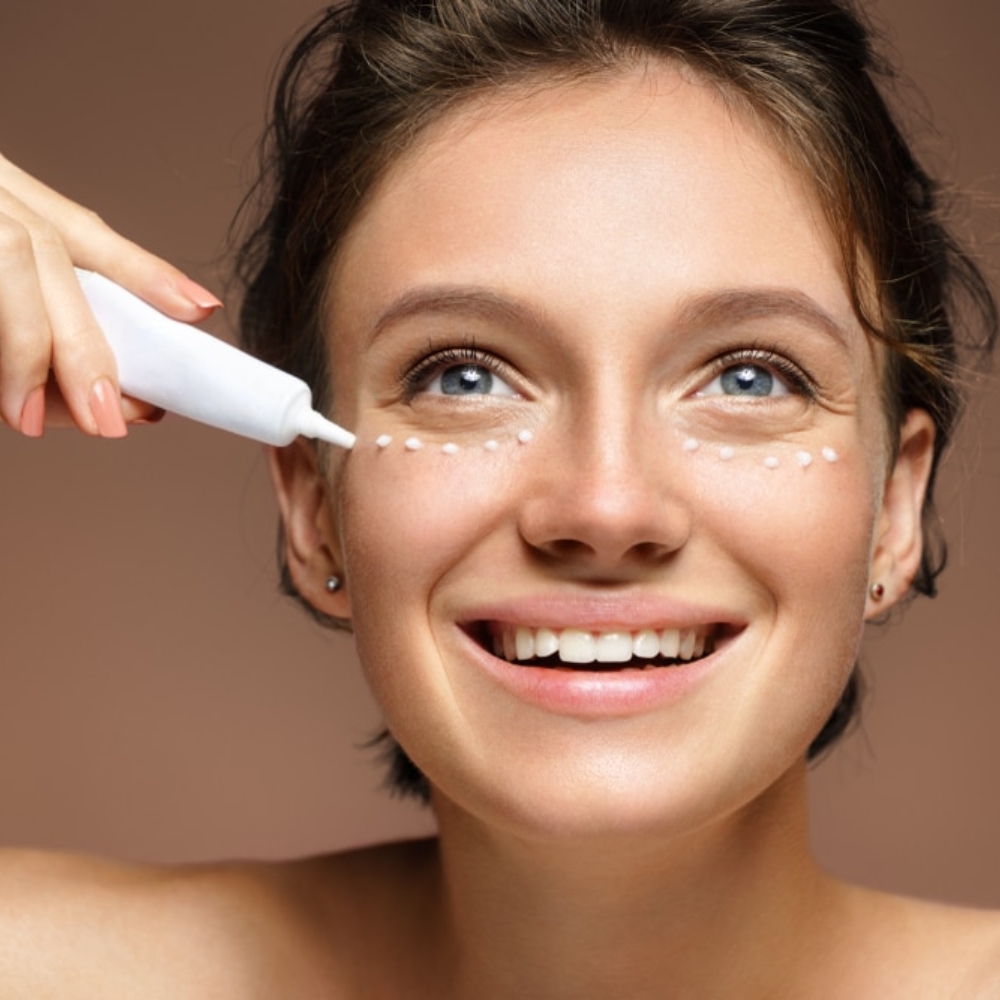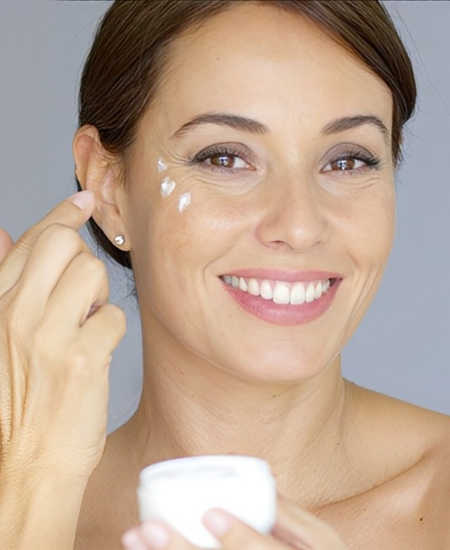When it comes to taking care of the delicate skin around our eyes, many skincare enthusiasts turn to eye creams.
These products claim to reduce fine lines, wrinkles, dark circles, and puffiness - all common concerns for people as they age. However, with so many different types of eye creams on the market, it can be overwhelming trying to figure out which one is best for you.
Two popular ingredients found in eye creams are retinol and caffeine. Both have their own unique benefits for the skin and are commonly used in anti-aging products. In this article, we will discuss the differences between retinol and caffeine eye creams and determine which one may be better suited for your specific skincare needs.
What Is Retinol Eye Cream?
Retinol, also known as vitamin A, is a powerful antioxidant and one of the most popular anti-aging ingredients in skincare. It works by increasing cell turnover and stimulating collagen production, resulting in smoother and firmer skin. When used in eye creams, retinol can help reduce fine lines and wrinkles, improve skin texture, and even out skin tone.
However, retinol can be too harsh for the delicate skin around the eyes. The eye area has thinner skin and fewer oil glands compared to the rest of our face, making it more sensitive to irritation. Therefore, it is essential to start with a low concentration of retinol (around 0.01%) and gradually increase over time to avoid potential side effects such as redness, dryness, and peeling.
Retinol eye creams are suitable for those with fine lines, wrinkles, and signs of aging around the eyes. It is also beneficial for people with sun damage and hyperpigmentation. However, if you have sensitive skin or are prone to irritation, it may be best to opt for a milder alternative like caffeine eye cream.
What Is Caffeine Eye Cream?
Caffeine is a natural stimulant commonly found in coffee, tea, and energy drinks. In recent years, it has become a popular ingredient in skincare products due to its ability to reduce puffiness and dark circles around the eyes. Caffeine works by constricting blood vessels and reducing inflammation, leading to a smoother and more refreshed appearance.
Unlike retinol, caffeine is gentle on the skin and can be used daily without causing irritation or sensitivity. It also has antioxidant properties that can protect the skin from damage caused by free radicals. However, caffeine does not have anti-aging benefits like retinol does.
Caffeine eye creams are best suited for those with puffy eyes, dark circles, and signs of fatigue. It can also be beneficial for people with sensitive skin or those who cannot use retinol due to its potential side effects.
Main Differences Between Retinol and Caffeine Eye Cream

There are several key differences between retinol and caffeine eye cream that make them suitable for different skincare concerns. Here are the main differences:
Anti-aging benefits
Retinol is renowned for its extensive anti-aging benefits, primarily due to its ability to boost collagen production and encourage cell turnover. This results in diminishing the appearance of fine lines and wrinkles, promoting smoother skin.
In contrast, caffeine lacks these specific anti-aging properties; it is more effective at addressing superficial issues like puffiness and dark circles. While caffeine can help create a refreshed look, it does not engage with the deeper structural changes in the skin that retinol provides.
Therefore, for individuals specifically seeking to combat signs of aging, retinol eye cream is often the preferred choice. When incorporating either ingredient into a skincare routine, it is essential to assess personal skin concerns and sensitivities to ensure optimal results.
Sensitivity
The eye area is more sensitive than the rest of our face, making it crucial to use gentle products that will not cause irritation or adverse reactions.
Retinol can be harsh on the skin, especially at higher concentrations, and may cause redness, dryness, and peeling. This is why retinol eye creams should be used with caution and gradually introduced into a skincare routine.
On the other hand, caffeine is generally well-tolerated by most skin types and can even help reduce inflammation caused by other ingredients like retinol.
It is a suitable alternative for those with sensitive skin or individuals who have experienced irritation from using retinol-based products. However, everyone's skin is unique and may react differently, so it is essential to patch test before incorporating any new product into your routine.
Skin concerns
Retinol and caffeine target different skin care concerns. As mentioned earlier, retinol is best for those looking to combat signs of aging such as fine lines, wrinkles, and sun damage. It can also help even out skin tone and improve texture.
In contrast, caffeine eye cream is more suited for superficial issues like puffiness, dark circles, and signs of fatigue. It can also be beneficial for individuals with sensitive skin or those who cannot use retinol due to its potential side effects.
Frequency of use
Retinol eye creams should be used sparingly and gradually introduced into a skincare routine to avoid potential side effects. They are typically recommended to be used at night, 2-3 times a week while building tolerance. Once the skin has adjusted, it can be used more frequently.
On the other hand, caffeine eye creams can be used daily without worry of irritation. They are often recommended to be incorporated into morning routines as they provide a refreshing effect and help reduce puffiness.
So these are the main differences between retinol and caffeine eye creams. Whether you choose to use one or both ingredients in your skincare routine, it's essential to understand their benefits and how they can address specific skin concerns. Always remember to patch test and consult with a dermatologist before incorporating any new product into your routine.
Pros And Cons Of Retinol And Caffeine Eye Cream

Before deciding to use retinol or caffeine eye cream, it's essential to understand the pros and cons of each ingredient. Here are some potential benefits and drawbacks to consider:
Retinol:
Pros:
- Extensive anti-aging benefits: Retinol has been proven to improve the appearance of fine lines, wrinkles, and sun damage.
- Boosts collagen production: This can lead to firmer and smoother skin over time.
- Improves texture and tone: Retinol can help even out skin tone and improve overall texture.
- Can be used for all skin types: With proper use and gradual introduction, retinol can benefit all skin types.
Cons:
- Potential irritation: Retinol can cause redness, dryness, and peeling if not used correctly.
- Sun sensitivity: Retinol can increase sun sensitivity, so it's crucial to wear sunscreen when using this ingredient.
- May take time to see results: It can take several weeks or months to see noticeable improvements from using retinol regularly.
Caffeine:
Pros:
- Reduces puffiness and dark circles: Caffeine is known for its ability to reduce swelling and constrict blood vessels, making it effective for reducing puffiness and dark circles.
- Refreshing effect: The cooling sensation of caffeine can feel refreshing and invigorating on the skin.
- Suitable for sensitive skin: Caffeine is generally well-tolerated, making it a suitable alternative for those with sensitive skin.
Cons:
- Limited anti-aging benefits: Unlike retinol, caffeine does not have extensive anti-aging properties.
- Superficial effects only: Caffeine may not address deeper structural changes in the skin like fine lines and wrinkles.
- May not provide long-term results: As caffeine only targets superficial concerns, its effects may be temporary if used as the sole ingredient in an eye cream.
So these are some potential pros and cons of using retinol and caffeine eye creams. It's essential to consider these factors and consult with a dermatologist before deciding which ingredient is best for your skin concerns.
Which Is Right For You?

No one is better than Retinol or caffeine eye cream - it ultimately depends on individual skin concerns and sensitivities. If you are primarily concerned with signs of aging, retinol may be the better option for its extensive anti-aging benefits. However, if you have sensitive skin or are looking to address superficial concerns like puffiness and dark circles, caffeine eye cream could be a suitable alternative.
It's also worth considering incorporating both ingredients into your skincare routine, using retinol at night and caffeine in the morning. This way, you can reap the benefits of both ingredients without overloading your skin.
Remember to always patch test and gradually introduce new products into your routine to avoid potential irritation. If you experience any adverse reactions from using either ingredient, it's best to discontinue use and consult with a dermatologist.
In the end, the right eye cream for you is one that addresses your specific skin concerns and suits your skin type. So do your research, patch test, and don't be afraid to experiment until you find the perfect eye cream for your eyes.
Is A Combination Of Retinol And Caffeine Eye Cream Possible?
Yes, it is possible and even beneficial to use both retinol and caffeine eye creams in your skincare routine. As mentioned earlier, each ingredient targets different concerns, so using them together can provide comprehensive results.
One approach is to use a retinol eye cream at night and a caffeine eye cream in the morning. This way, you can address signs of aging while also getting the refreshing effects of caffeine to start your day.
Another option is to look for an eye cream that contains both ingredients. This allows for a more targeted and efficient application without having to buy two separate products. However, be sure to check the concentrations of each ingredient and patch test before incorporating it into your routine.
It's also important to note that using multiple active ingredients in one product may increase the risk of irritation, so it's crucial to follow proper usage guidelines and listen to your skin's needs.
How To Choose The Right Eye Cream For You

Now you decide which is better for you but how do you choose the perfect eye cream for your needs? Here are some tips to consider:
- Identify your primary skin concerns: Are you looking to address signs of aging, puffiness, dark circles, or all of the above? This will help narrow down which ingredients and products to look for.
- Read ingredient lists carefully: Look for key ingredients like retinol and caffeine and check their concentration levels. Higher concentrations may provide more noticeable results but also increase the risk of irritation.
- Consider your skin type: Some ingredients may be too harsh for certain skin types, so it's essential to know yours and find products that cater to its specific needs.
- Research and read reviews: Take the time to read up on different eye cream options and see what others with similar concerns have to say about their experiences.
Remember that finding the right eye cream for you may take some trial and error. Don't be discouraged if the first product you try doesn't work out, as everyone's skin is unique. Keep these tips in mind, listen to your skin, and consult with a dermatologist for personalized recommendations.
FAQs
What are the benefits of using retinol eye cream for dry skin?
Retinol eye cream is beneficial for dry skin as it promotes collagen and elastin production, which helps to improve the texture and firmness of the under-eye skin. Retinol also accelerates cell turnover, which can help reduce the appearance of dull and dry skin, making it smoother and more youthful.
How do the best caffeine eye creams help with under eye puffiness?
The best caffeine eye creams help reduce under-eye puffiness by constricting blood vessels and reducing fluid retention. Caffeine has anti-inflammatory properties that can alleviate swelling, makingunder-eyethe under eye area look less puffy and more refreshed.
Can hyaluronic acid be used with either retinol or caffeine eye cream?
Yes, hyaluronic acid can be used with either retinol or caffeine eye cream. Hyaluronic acid is a powerful hydrator that can help counteract the dryness that may be caused by retinol, and it can enhance the moisturizing effects of caffeine eye creams. This combination ensures the under-eye skin stays hydrated and plump.
Which is better for collagen and elastin production: retinol or caffeine eye cream?
Retinol is better for collagen and elastin production compared to caffeine eye cream. Retinol stimulates the production of these essential proteins, which helps to improve the firmness and elasticity of the under-eye skin, reducing the appearance of fine lines and wrinkles.
What should I consider if I have dull and dry skin: retinol or caffeine eye cream?
If you have dull and dry skin, retinol eye cream might be more beneficial as it promotes cell turnover and improves skin texture. However, if you experience mild skin irritation with retinol, starting with the best caffeine eye creams could be a gentler option, as they also provide anti-inflammatory benefits and can help reduce puffiness.
Can retinol or caffeine eye cream cause mild skin irritation?
Both retinol and caffeine eye creams can cause mild skin irritation, especially if you have sensitive skin. Retinol is more likely to cause dryness and irritation, so it is important to start with a lower concentration and gradually increase usage. Caffeine eye creams are generally milder but can still cause irritation if used excessively or if you have very sensitive skin.
Which eye cream is better for immediate results: retinol or caffeine?
For immediate results, caffeine eye cream is better as it quickly reduces under-eye puffiness and dark circles by constricting blood vessels. Retinol eye cream, on the other hand, provides long-term benefits like improved collagen production and skin texture but takes longer to show visible results.
Is it safe to use both retinol and caffeine eye creams together?
Yes, it is safe to use both retinol and caffeine eye creams together. You can apply caffeine eye cream in the morning to reduce puffiness and retinol eye cream at night to promote collagen production and cell turnover. Always ensure to follow with a moisturizer containing hyaluronic acid to keep the under-eye skin hydrated and to reduce any potential irritation.
Conclusion
In conclusion, both retinol and caffeine eye creams have their pros and cons. It's essential to consider your skin concerns, sensitivities, and usage guidelines when deciding which ingredient is best for you.
Additionally, incorporating both ingredients into your routine or using a combination product can provide comprehensive results. Remember to patch test and consult with a dermatologist if you experience any adverse reactions.
Ultimately, the perfect eye cream for you is one that addresses your specific skin concerns and suits your skin type. With these tips in mind, you'll be on your way to brighter, more youthful-looking under-eyes in no time!
Subscribe to our email newsletter and unlock access to members-only content and exclusive updates.

Comments